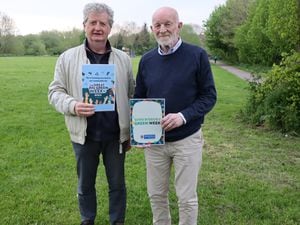Major block to Shrewsbury relief road planning permission removed
One of the major hurdles blocking planning permission for Shrewsbury's North West Relief Road looks to have been cleared.

The water company Severn Trent had wanted detailed assessments carried out before the application is approved – to make sure any work does not pollute the source of Shrewsbury's drinking water.
The concerns related to construction for the bridge planned as part of the road at Shelton, and the possibility for contamination of boreholes used by Severn Trent to extract water.
But, now the utilities company has said it is happy for the council to proceed to make a decision on the planning application, without carrying out the tests.
Instead, it says the tests must be a condition of any approval of planning permission – meaning they would have to be completed before any construction starts.
The news comes as Shropshire Council revealed the date for the contentious relief road planning application to be decided.

The move by Severn Trent removes one of the major blocks to progress on the project, although there has not yet been confirmation that the Environment Agency (EA), which had raised similar concerns to Severn Trent, is satisfied with the same approach.
In a letter to the authority, Gareth Smith, town planning manager at Severn Trent, said the firm was prepared to drop its previous demands – but will be relying on the council to deal with the matter 'appropriately'.
He said: "As you know, we need to be confident that the construction and operation of the road will not result in unacceptable risk levels at water supply assets that our customers rely on.
"We must ensure any contaminants that could occur from the construction or operation of the road are prevented from entering the environment and particularly the groundwater.
"Without such safeguards, we would have to object to the application.
"In our previous response to the application, we explained that although we have several concerns about the assessments made by the applicant, we could agree to disagree on some outstanding technical items if certain safeguards were secured prior to approval.
"Therefore, we requested the provision of a turbidity protocol and a road drainage management plan to be prepared ahead of the determination of the application. These would, as far as is practicable, reduce the risk of contaminants to enter groundwater and protect supplies for our customers.
"In the response from the applicant, confusion was expressed about our desire to see the turbidity protocol and road drainage plan agreed in advance of the application being determined. Given the sensitivity of our assets you will appreciate that we have sought to ensure as much work is done as possible in advance of a decision on the application being made.
"We think it is clear why we would want these matters to be addressed ahead of determination, so all stakeholders can clearly see how our concerns would be mitigated. We were also of the view that addressing our concerns in advance of planning committee would have been an appealing prospect to the applicant, to show thoroughness in approach and to avoid the need for onerous pre-commencement conditions.
"However, following further discussions with the applicant and yourself, we have sufficient comfort that planning conditions will provide the necessary safeguards."
He added: "With further commitment given from yourself that the planning authority will act accordingly to ensure that the council will approach any such conditions with the required rigour, we are prepared to accept planning conditions to provide the safeguards we need in advance of any decision being made.
"We are accepting this approach due to the status of the applicant as the incumbent highway authority, and therefore we expect that the process for dealing with the conditions is completed thoroughly and in consultation with both ourselves and the EA."
The development will be seen as a major positive for Shropshire Council, which has faced repeated set-backs in its bid to build the road.
It come as the Government appears to have solved another of the council's biggest problems – how it would pay for the expected increase in costs for the road.
The Department for Transport and Transport Secretary Mark Harper have both said the government will now pay for 100 per cent of project using money from the Prime Minister's decision to scrap the northern leg of HS2 – although no figure has yet been revealed for how much more the road will cost above its 2019 estimate of £80m.





